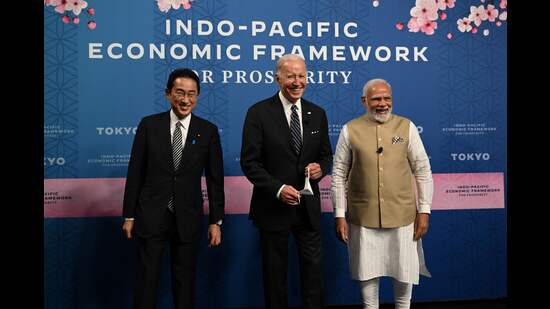The US must provide concrete benefits to IPEF signatories
While the scope is broad enough to provide an inclusive platform, the ambiguity, vagueness, and the lack of specific agreements can render it toothless
At the recently concluded Quad summit in Tokyo, India joined the United States (US)-led Indo-Pacific Economic Framework (IPEF), created to provide an alternative trading arrangement and counter Chinese dominance in the region.

IPEF provides an opportunity for the US and India to integrate with the region. It is important to situate IPEF in the changing global world order, which has been marked by Donald Trump’s trade war and the global leaning towards protectionism and economic nationalism, the rise of authoritarianism in many parts of the world, and the spread of anti-immigration policies.
This gradual movement accelerated after Covid-19 and has now been exacerbated by the Russia-Ukraine war. The new world order can be described as “impeded-globalisation”, a term coined by my colleague, Narayan Ramachandran. Impedance, a term borrowed from electrical engineering, means the existence of both resistance and reactance.
In this world order, trade of some goods and services will recede as countries try to pursue risk-mitigation strategies and the trade of goods will be determined as much by geopolitical and strategic rationale as economic ones. The supply chain resilience of strategic commodities will be a predominant notion. Trade within predefined blocs may flourish, but global trade will flounder.
In this context, IPEF is a chance for India and the US to mitigate past errors in judgment on global trade agreements. The Trump administration had walked out of the previous iteration of such an agreement (the Trans-Pacific Partnership), and India has been copping a fair bit of criticism for being increasingly protectionist and refusing to partake in the Regional Comprehensive Economic Partnership (RCEP). Further, a credible geopolitical and strategic counter to China cannot exist without a beneficial economic platform with the East Asian economies.
Perhaps reflecting the new world order scenario, strategic concerns take as much prominence as economic ones. IPEF rests on four pillars: Connected economy, which will set standards on digital trade, data flows and data localisation; resilient economy, which will guard against supply chain shocks and disruptions; clean economy, with focus on the environment and decarbonisation; and fair economy, to counter money laundering and corruption and ensure fair taxation.
Thus, IPEF is about setting standards for trade rather than a trade deal itself, and therein lies its biggest weakness. While the scope is broad enough to provide an inclusive platform, the ambiguity, vagueness, and the lack of specific agreements can render it toothless. To counter China in the region, what the Indo-Pacific region needs is increased market access to the US, lower tariffs and higher infrastructure investment. The Biden administration has specifically stated that market access and tariff negotiations are off the table for now, as it will require Congressional clearance and the US is deeply divided on free trade issues.
It is also important to note that India has joined the launch as an initial founder and officials maintain that they will be a part of the negotiations to see where this will lead. However, this does not impose an obligation to join the eventual agreement. Or given that IPEF allows for signing up to selective modules, India could become a weak participant, if the set standards are not favourable to Delhi, for instance on data localisation, labour standards and certain environmental restrictions.
The Chinese are already providing market access, financial support and huge infrastructure investment in the region in the form of RCEP and its Belt and Road Initiative. As an expansion to Quad, IPEF can have strategic value, but if the US is serious on being seen as a credible alternative to China in the region, it must figure out its domestic political space and provide concrete benefits to signatories of this arrangement.
Anupam Manur is professor of economics, The Takshashila Institution, an independent centre for research and education in public policy
The views expressed are personal
Continue reading with HT Premium Subscription




